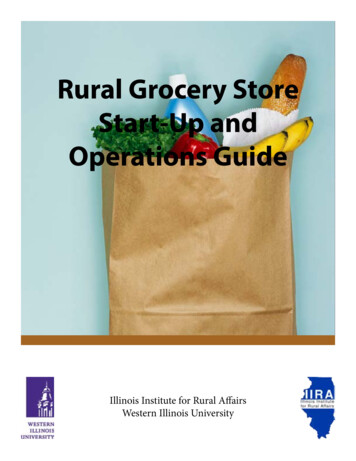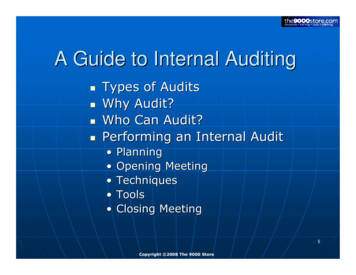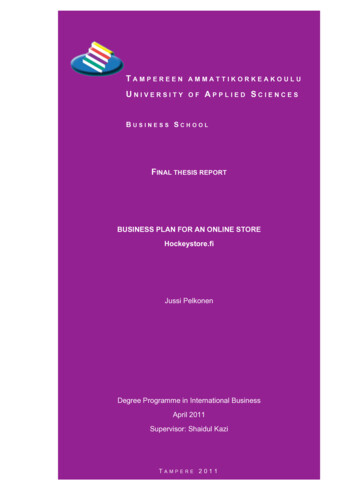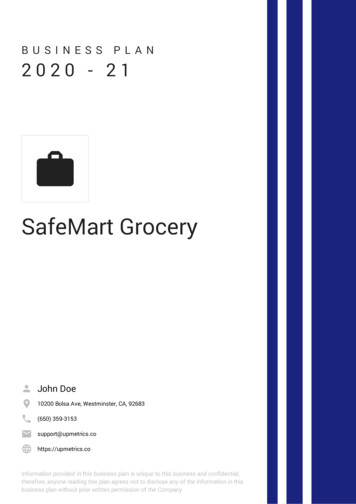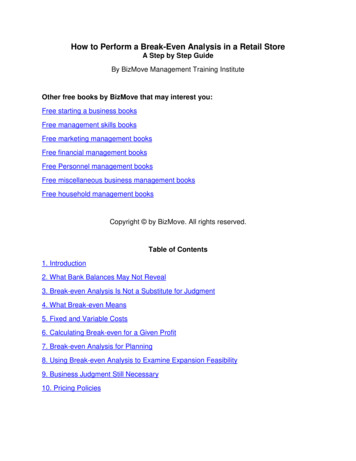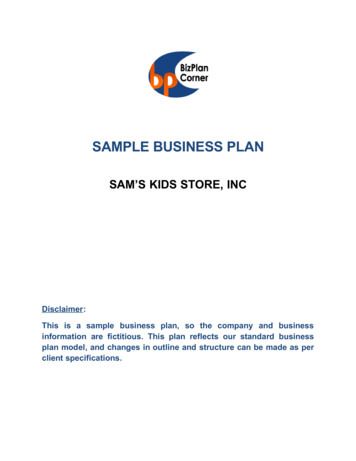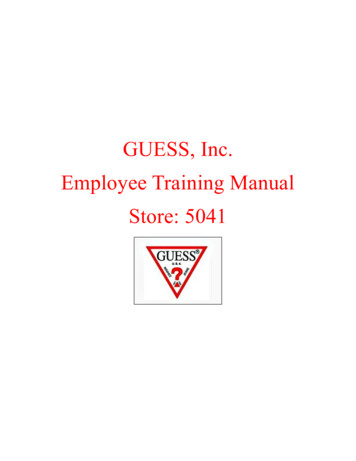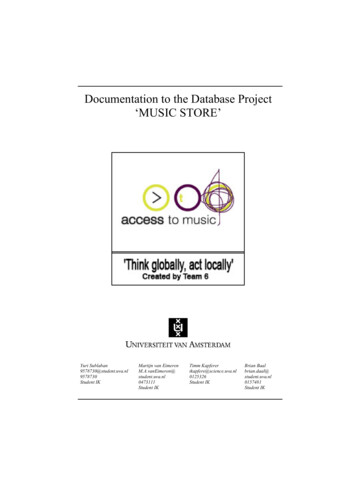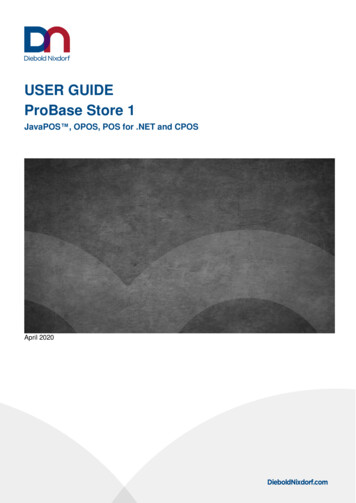
Transcription
USER GUIDEProBase Store 1JavaPOS , OPOS, POS for .NET and CPOSApril 2020
ImprintMathias JankeDiebold NixdorfSystems Group Retail ProductsWohlrabedamm 3113629 Berlinmathias.janke@dieboldnixdorf.comSystems Group Retail Products2
Revision historyVersionDateAuthorComment/Change1.0December 2019Mathias JankeInitial Version2.0January 2020Mathias JankeFinal version based on ProBase Store 1.02.1March 2020Mathias JankeTypos corrected3.0April 2020Denis KunißVersion corresponding to ProBase Store 1.1Systems Group Retail Products3
Copyright and TrademarksMicrosoft and Windows are registered trademarks of Microsoft Corporation.Diebold Nixdorf and BEETLE are registered trademarks of Diebold Nixdorf, Inc.Linux is a registered trademark of Linus Torvalds.Red Hat and CentOS are registered trademarks of Red Hat, Inc.JavaPOS is a trademark of Sun Microsystems, Inc.Oracle and Java are registered trademarks of Oracle and/or its affiliates.iButton is a registered trademark of Maxim IntegratedAll other company names and trademarks mentioned in this documentation are the property of theirrespective owners. Copyright 2020 by Diebold Nixdorf Systems GmbHSystems Group Retail Products4
Contents1References . 72Introduction . 83General information . 9456783.1Background . 93.2Environment at Diebold Nixdorf . 103.3License agreement / rights of use . 10Architecture and interfaces . 114.1Unified Device Manager . 114.2JavaPOS guide line . 134.3Product installer . 13Specifications . 175.1Released installer versions . 175.2Software requirements. 175.3Supported peripherals . 225.4Supported operating systems . 255.5Supported Java Runtime Environments . 255.6Components included . Fehler! Textmarke nicht definiert.5.7Available add-ons . 26Installation of ProBase Store . 276.1Prerequisites . 276.2Installation under Windows . 276.3Installation under Linux . 326.4Update installation . 336.5Upgrade installation . 33Uninstallation of ProBase Store . 347.1Uninstallation under Windows . 347.2Uninstallation under Linux . 35Configuration. 37Systems Group Retail Products5
9108.1JavaPOS configuration . 378.2Java VM configuration . 408.3OPOS configuration . 418.4P4DN configuration . 428.5CPOS configuration . 438.6UDM configuration . 438.7D&S Platform T/SOP configuration . 50Logging . 529.1Logging during installation . 529.2Logging during uninstallation . 539.3JavaPOS logging . 539.4JavaPOS Configurator logging . 579.5OPOS logging. 579.6P4DN logging . 599.7CPOS logging . 599.8UDM logging . 599.9D&S Platform T/SOP Logging . 62Programming examples. 6310.1 JPOS . 6310.2 OPOS . 6310.3 CPOS . 6310.4 P4DN . 6311Tools . 6411.1 ProBase/JavaPOS Tool Center . 6411.2 OPOS UDM Configuration Updater . 6611.3 Test tools . 6611.4 D&S Platform T/SOP . 7211.5 PBReport . 7412Appendix . 7512.1 End-user license agreement . 75Systems Group Retail Products6
1 ReferencesDiebold Nixdorf. (2016). Guide Line Definition for JavaPOS for Linux OS (version 1.6).Diebold Nixdorf. (2016). Guide Line Definition for JavaPOS for Windows OS (version 1.3).Diebold Nixdorf. (2017). JavaPOS Unified Device Manager Programmers & User Guide (version 1/14).Diebold Nixdorf. (2018). Technical Service and Operation (T/SOP) User Manual (version 1450).Diebold Nixdorf. (2019). Diagnostics and Serviceability Platform Integration Manual (version 1620).Diebold Nixdorf. (2019). Installation Guide ProBase Store 1 Linux (version 2.0).Diebold Nixdorf. (2019). Installation Guide ProBase Store 1 Windows (version 2.0).Diebold Nixdorf. (2019). ProBase Store 1 Migration Guide (version 1.0).National Retail Federation. (2014). UnifiedPOS Retail Peripheral Architecture (version 1.14.1).Russell, J., & Laan, M. (2019). Inno Setup Help. Retrieved from Inno Setup Help:https://www.jrsoftware.org/ishelp/Systems Group Retail Products7
2 IntroductionProBase Store, the new middleware product for retail, is the direct successor to the current middlewareproducts ProBase Retail 1.x and ProBase POS 2.x and is therefore the middleware product for all activeand future DN Retail products.The content of ProBase Store largely corresponds to the combination of the two previous productsProBase POS and ProBase Retail. The UnifiedPOS1 interfaces JavaPOS2, OPOS3 and P4DN for POSperipherals and JavaPOS for cash recyclers and security scales are included. Test and configurationtools (such as the JavaPOS Configurator or SwingSamples), released firmware versions for thesupported cash recyclers and the D&S Platform with the graphical user interface T/SOP are also part ofProBase Store.Following the DN JavaPOS guideline, ProBase Store, like ProBase POS before it, offers automatedintegration of JavaPOS add-ons, automated generation of customizable JavaPOS configurations andseparation of configuration and log files from the installation location of ProBase Store.A new feature of ProBase Store is the use and delivery of standardized OpenNames to simplify therelationship between hardware and OpenNames.This user manual is intended to provide an overview of the functions and tools provided with ProBaseStore. Installation and uninstallation, configuration of the individual software layers as well as logging aredealt with separately.Supported operating systems, peripherals and cash recycler as well as requirements regarding the Javaruntime environment, system and device drivers, firmware versions and other software frameworks arealso covered in this manual. However, this information may change slightly for each ProBase Storeversion. Therefore, please refer to the release notes of the corresponding ProBase Store version, asthey will provide more up-to-date information in this www.javapos.com3 OPOS - OLE for Retail POS2Systems Group Retail Products8
3 General information3.1 BackgroundThe increasing use of Microsoft operating systems on retail market systems as well as the associatedstandard OPOS in 1994 had at that time led to the first module-based provision of the peripheral driversaccording to the OPOS standard.With the emerge of the Java technology to be usable for retail branch solutions and the introduction ofthis programming language into the POS application world in 1997, it became necessary for DieboldNixdorf to provide the corresponding JavaPOS drivers.Based on evaluation results on Java, a close cooperation between Diebold Nixdorf and its retailcustomers developed in the realization of projects based on Java technology. In the past, JOWE4 (JavaOPOS Wrapper) was the first available software / abstraction layer for controlling retail peripherals fromJava applications under Microsoft Windows operating systems.At the same time, the standard JavaPOS developed under the proactive cooperation of Diebold Nixdorfin the relevant committees for this technology approach. On the background of the progress in theinternational JavaPOS standardization, the retail market could now also be offered a pure JavaPOSadapted to the current requirements of the market.About two years later, the standardization committee decided to meet the requirements for thesynchronization of OPOS and JavaPOS and the standard UnifiedPOS was created. UnifiedPOS is anacronym for Unified Point of Service (UPOS), which is used to unify the OPOS and JavaPOS interfaces.UPOS is not really a driver implementation, but rather an abstract interface definition. The conversion ofthe definition into usable code as driver for POS applications is OPOS (as ActiveX or ATL objects in theMicrosoft world) and JavaPOS (as JAR modules in the Java world and thus for Windows and Linuxoperating systems).Since 2002, with the introduction of the .NET Framework on Microsoft Windows operating systems,there has been another technology for application programming and starting 2003 there were requestsfor a further implementation of UPOS for .NET based POS applications. This POS for .NET (P4DN)implementation of the UPOS standard is based on the .NET technology of the Microsoft Windowsoperating systems.The provision of these three driver stacks, which have all been implemented according to the samedesign principles, has led to ProBase POS/ProBase Retail and now to ProBase Store. The peripheralinterfaces JavaPOS, OPOS and P4DN will be delivered with ProBase Store in the future.As a further interface, Diebold Nixdorf also offers the interface CPOS for applications, which weredeveloped in the programming language C. This is also an implementation according to the UPOSstandard; here the access takes place via the usual methods in the C programming world.The basis of ProBase Store is the implementation of the UPOS standard for JavaPOS, which is alwaysthe interface to the peripheral devices. The interfaces OPOS and P4DN are supported withsimultaneous use of the so-called Unified Device Manager (UDM).4no longer supportedSystems Group Retail Products9
3.2 Environment at Diebold NixdorfProBase Store can be used on all released DN Retail systems under the ProBase Store approvedoperating systems.The approved operating systems for each DN Retail system can be found within the current configuratorin the DN intranet portal (go to Intranet Portfolio Our Portfolio Services Configurator/Price list). Incase no access is granted to that site, a Diebold Nixdorf account manager has to be contacted.Details about the supported systems and peripherals as well as dependencies regarding driver andfirmware versions can generally be found in in chapter 5 - Specifications as well as the respectiveProBase Store Release Notes.3.3 License agreement / rights of useThe software ProBase Store 1 is subject to license and usage conditions. The exact wording of the EndUser License Agreement can be found in the appendix, chapter 12.1 - End-user license agreement.Systems Group Retail Products10
4 Architecture and interfacesProBase Store 1 provides the well-known interfaces JavaPOS, OPOS and POS for .NET (P4DN) as wellas CPOS, an interface for C-based applications, for Windows and Linux based operating systems.These interfaces are all implementations based on the UnifiedPOS specifications with the followingversions: JavaPOS 1.13OPOS 1.13P4DN 1.13CPOS 1.13The base of ProBase Store is the JavaPOS of Diebold Nixdorf. The interfaces OPOS, CPOS and P4DNare supported if the UDM is used at the same time.The interfaces OPOS 1.6 and 1.3, JavaPOS 1.7 and 1.5 as well as RDI and LRDI are not supported byProBase Store and cannot be operated in parallel with the interfaces of ProBase Store.Note: OPOS and P4DN are reserved for the Windows operating systems, since the basic technology isonly available under Windows.Note: ProBase Store contains the JavaPOS controls based on UnifiedPOS 1.14 and supports the POSfor .NET Frameworks 1.12 with the functionality specified with UnifiedPOS 1.12 and the POS for.NET Framework 1.14 with the functionality specified with UnifiedPOS 1.13.4.1 Unified Device ManagerThe UnifiedPOS standard describes the device interfaces independently to the implementation.Normally, this is done with a Unified Modeling Language (UML). However, different technologies andimplementations are used in the retail sector, for which some separate appendices have been added tothe UnifiedPOS specification. The most important implementations of the standard are: OPOS (since 1994)JavaPOS (since 1998)POS for .NET (since 2006)Hardware manufacturers needs to offer all three implementations to support the entire UnifiedPOSstandard. Differences in the implementation technologies and therefore in the methods, properties andevents, as well as differences between Windows and Linux operating systems, can lead to differentbehavior of the addressed hardware although the implementations all follow the same standard. Furtherrequirements of the application developers to support other technologies (for example in the Linux areafurther non-Java based API) have not been taken into account yet.Normally, there is no way to allow an application written in a particular technology to access aUnifiedPOS device interface written in another technology. This usually requires an adapter or wrapper.Diebold Nixdorf has developed the Unified Device Manager based on the different implementationtechnologies, the different operating system types (Windows and Linux) as well as the differentimplementations of the UnifiedPOS standard.The Unified Device Manager provides a socket-based client-server construct, which uses JavaPOS forthe communication with the hardware and provides all other implementation technologies according toSystems Group Retail Products11
the UnifiedPOS standard via generic service objects. This approach is also important for JavaPOS assoon as the UDM client and the UDM server are to be used on different devices (e.g., mobile POS).The following figure shows the UDM architecture as it is provided for Windows.Figure 1: UDM architecture under WindowsThe generic service objects convert the method calls of the application into corresponding JavaPOScalls, just as the answers from JavaPOS are converted back into the target implementation for theapplication. For the application itself, the UDM and the shared JavaPOS are presented transparently.This results in the following advantages for the customer: An identical behavior of the device services under OPOS, JavaPOS, POS for .NET and CPOSIn the OPOS area, the common controls can be used againCoexistence of Diebold Nixdorf device services or service objects with those of third-partymanufacturers is possibleUnifiedPOS remains the standard long-term constantA common software stack for POS peripherals, SCO and ACO systemsHarmonized interfaces for applications such as TP.net, TPiSCAN and retail partner applicationsSystems Group Retail Products12
4.2 JavaPOS guide lineBy working with the UPOS standard, it turned out that not everything has been standardized or thatthere are no guidelines for the implementation. As a result, Diebold Nixdorf, together with selectedpartners and customers, developed a JavaPOS guideline56 that includes the following topics: Packaging and delivery of JavaPOS componentsConfiguration of the JavaPOS modules to the desired hardwareHandling additional functions for firmware and devic
Systems Group Retail Products 8 2 Introduction ProBase Store, the new middleware product for retail, is the direct successor to the current middleware products ProBase Retail 1.x and ProBase POS 2.x and is therefore the middleware product for all active and future DN Retail products.
